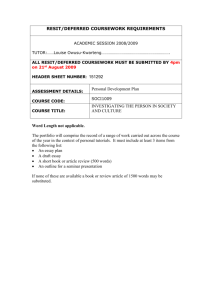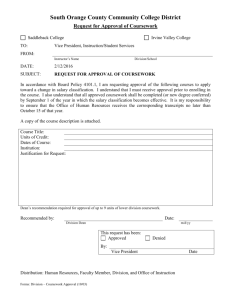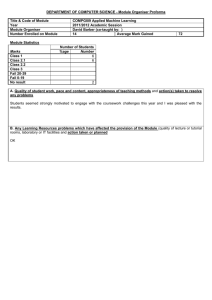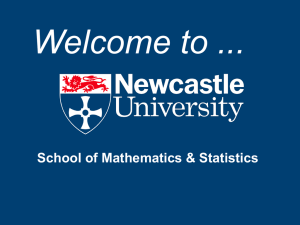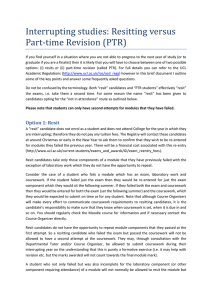Stage 2 Induction Presentation (by Peter Avery)
advertisement
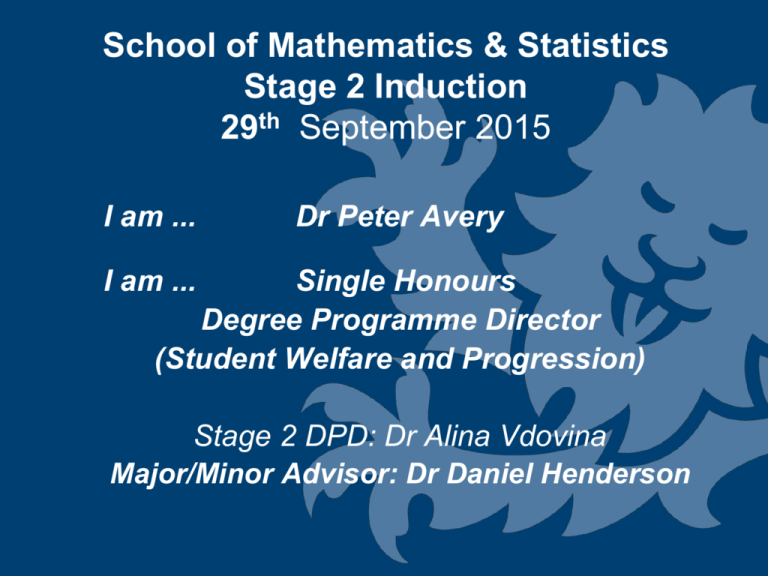
School of Mathematics & Statistics Stage 2 Induction 29th September 2015 I am ... Dr Peter Avery I am ... Single Honours Degree Programme Director (Student Welfare and Progression) Stage 2 DPD: Dr Alina Vdovina Major/Minor Advisor: Dr Daniel Henderson Contact Details Dr Peter Avery Room 3.04 P.J.Avery@ncl.ac.uk Entering Stage 2 - Timetable Please check your timetable for both Semesters carefully. Contact PJA if there is a clash. Three timetabled hours per module. Normally 2 lectures and one problems class/drop-in session. Lecturer will tell you which is the Problems class/dropin session at the first timetabled hour. There may be 3 lectures in the 1st week. About half the modules have problems classes in even weeks and half in odd weeks in order to spread the assessments. Modules can be changed in first 2 – 3 weeks of each semester (DPD request Form). Coursework As the material gets more difficult, it gets progressively more difficult to teach yourself from the lecture material. Thus it is crucially important to attend lectures and other classes and to attempt all the set work in order to do well. Expect 4 or 5 written assignments in a 10 credit module • Assignment set a few days before … • Problem class, one week before … • Drop-in class, a few days before submission. CBAs will be used. There will be a revision CBA0 for most modules. Deadlines are 4.00pm for coursework and midnight for CBAs. Late work is not accepted. Coursework continued Most coursework is intended to be largely ‘formative’, i.e. it is intended to help you learn the material. The marks given for such coursework are an incentive for you to complete the coursework, and the marks awarded for coursework are often higher than for exam marks (particularly CBAs). You should not expect the marks available to reflect the amount of time spent on coursework. If ill etc. and unable to complete a piece of work, complete a PEC Form and take to the Stage DPD. Extensions possible for major projects (>5% of module) – submit a PEC form in advance of the deadline and take to the Stage DPD. Passing Stage 2 Aim to pass all your Stage 2 modules in January/June. Your first attempt will be the mark that counts unless it is less than 40. Passes at resit count as 40. Only one resit is allowed on each module. You must pass Stage 2 in order to proceed to Stage 3. In BSc degrees, Stages 2 and 3 are weighted 1:2 in calculating the final average. (1:2:3 in 4-year degrees). Passing Stage 2 ctd Resits are in August. Don’t book a holiday in August. Submit PEC, if appropriate – with evidence. Keep your tutor informed. Repeating a year setting aside the first attempt is only allowed if there are very exceptional personal circumstances, e.g. major illness. Presentations Single honours students do a 5-minute presentation as long as they are registered for MAS2213. The presentation will occur in one of your Stage 2 modules. The coordinator is Dr Nick Parker. He will inform you when and in which module you are doing a presentation. Details will be given at the presentation session. Feedback Feedback on coursework: • • • • indications where things have gone wrong some general feedback access to correct solutions Drop-in class, where you can ask questions. Feedback on exams: • General feedback is given: mark distribution, scaling, • Individual feedback on your scripts is available on request. Communication You can use email to contact your tutor or lecturers. Tell your tutor if you have personal/ health problems that affect your academic work. You can organise meetings with your tutor through eportfolio. Please use your University email address to contact us, not a private email address (you might not get a reply). Please don’t expect a running email conversation or ask for detailed mathematical explanations. Check your University email regularly – this is how we communicate important information. MMath/MMathStat More advanced study Major project including independent study, oral and poster presentations Graduates do well in the job market. If you think you might want to do the 4-year degree it is best to register now. Decision on whether you do a 3- or 4- year degree must be made early in Semester 2 of year 3. You must average 60 or more in Stage 2 to be allowed to do the 4-year degree. Bursaries of £1000 are available for those averaging 70+ to help support the 4th year of study. Discuss this with your tutor or myself if you want more details. Behaviour You are expected to maintain the highest level of behaviour and be considerate to staff and fellow students. Keep mobiles to silent mode during lectures, tutorials, etc. If you are unavoidably late for a lecture and the lecture has started when you arrive at the room, enter quietly. DO NOT let the door bang behind you. Take a seat near the door to avoid disruption to the lecturer and other students. Talking should be kept to a minimum. Ask the lecturer a question if you are unsure about something. Penthouse The Penthouse (Level 7) is available for the use of all Mathematics & Statistics students(including JH) from 9.00am till 5.00pm, Monday to Friday. There is a work area and power points. Wifi is available there. There is also social space. Please keep it clean and tidy. Avoid excessive noise in the social areas. There is also a work area(reading room) on level 4 of the Herschel building. Staff-Student Committee Meets about twice a Semester to discuss any issue affecting undergraduate students. For example proposals to change degree programmes or problems with a specific module. Usually meets at 1.30pm on a Wednesday. Lunch is provided. Good thing to put on your CV. Volunteers?
